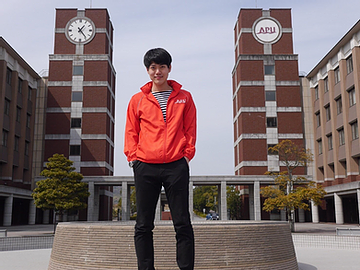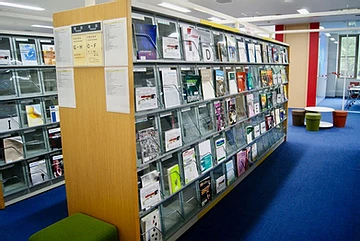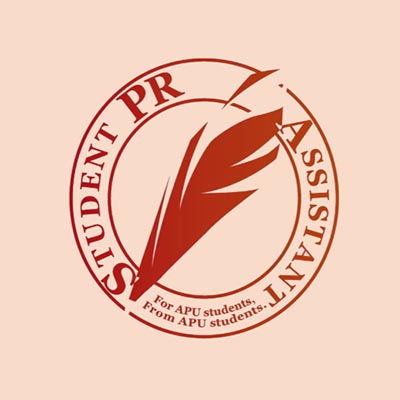Hello everyone. In this article series, Job Hunting Tips for APU Students 2020, we asked students who have successfully found employment for the secrets to their success, including their thoughts behind job hunting as well as their activities. Take a big step into life after university and find the answers that are right for you from interviews with upper-year students. I hope job hunting leads to success for all of you.
Job offer from GAFA: Lee Jaehoon
In the fifth part of the series, we talked to Lee Jaehoon who has received a job offer from GAFA.
Profile
Country: South Korea
College: College of International Management (APM)
Year: Graduated September 2020
Leadership experience during university: FLAG, AMC, Korean Week finance and accounting group, WEST

Question 1: When did you start job hunting?
I started my job hunt in earnest in March of my third year. I registered with recruiting websites in Japan and my home country of South Korea, and joined company information sessions, taking every opportunity I could to find a job. I began thinking about looking for a job after graduation immediately after starting university, so even when I took a leave of absence for military service I did a long-term internship in the 3 months before my service began. I later did two more internships during the long breaks between school years. The company that offered me a job screened me after I joined an information session in South Korea in April of my fourth year, and I received an offer in June.
Question 2: Where did you focus your efforts the most in job hunting?
I focused on getting to know companies as well as myself. If you join a company without really knowing what type of person you are or what you can do at the company, time will pass without you setting any goals and you will more likely find it difficult to choose your future path. It is important to continue doing thorough self-analysis and researching companies until you can clearly answer questions about yourself, after which you can gain lots of experience, for example by attending information sessions and participating in internships. Clarifying your own values helps you set your career plan and goals so that you can join a company after determining if it is a good fit based on what you could do there. You must keep updating your self-analysis and company analysis until you are done job hunting to perfect them. I found that information I did not pay much attention to sometimes became important later. Keep track of all information you get and continue practicing and updating your analyses.
Question 3: What type of self-analysis did you do for job hunting?
I had various people analyze and assess me. I started seriously doing self-analysis in May of my third year. In other people’s analysis of me, many had similar opinions, and I thought those comments must show the true me. Common points also appeared in company personality assessments, so they were also useful when I took my aptitude tests. I have also kept a journal of all the events I have experienced from age 15 until the present. I took care to ask myself questions at each event and explore my experiences further. I put together all the information and wrote a script so that I could answer in the way that was most like me. I see self-analysis as figuring out what kind of person you are. It is important to clarify your personality and any values that you only have a vague idea about so that you can show a succinct summary.
Question 4: How did you promote the points you discovered in self-analysis?
I determined what the company culture and climate was like and expressed in my own words the strengths I have that matched the company. When people hear the word ‘leadership,’ each person's ideal leader is different. The role of a leader as I see it is to be someone who supports the members of an organization so that they can exercise their full potential and boost the organization’s efficiency. I placed importance on harmony of the organization so that all member’s ideas, not just those of the leader, are included to create a base of decisions that best suit the organization. Rather than just promoting my strengths, I prepared myself so that I could express exactly what I thought elements I consider strengths to entail in my own words. Conversely, I promoted myself in interviews by talking about experiences when I faced adversity. I talked in detail about times when I had problems and worked to overcome them, and what results I achieved on those occasions. Thanks to my efforts analyzing companies, I knew that the company who offered me a job was seeking was a recruit with leadership skills who could initiate change. During the job screening process, I was able to show the company the strengths I possessed that they wanted the most.

Question 5: What methods did you use to analyze companies?
What I focused on in company analysis were company culture and the type of recruit they sought. Some companies pursue low cost of products while others focus on research and development, using new technologies as their strength. It is important to think of how the company culture and your own values match up. To understand the company culture, I browsed all news sections that the company published so I would always have an idea of the management trends. Instead of picking and choosing information, I made it a point to get all the information. For information about the type of recruit sought, in addition to looking it up, I also talked to people who actually worked at the company. I visited more than ten alumni. By asking all the questions I had, including ones I thought I already knew the answer to, I could be sure I knew everything there was to know about the company for the interview. During the interviews, I made sure I could express the values and strengths of mine that matched the company culture in both my attitude and what I said. I sensed that doing this required a high level of Japanese.
Question 6: How did you improve your Japanese skills for interviews?
I thought about how I would answer questions that I expected in the interview and memorized my responses over and over again. I started preparing for the job screening three weeks before the interview. I thought of about 50 questions I might be asked and wrote responses in Japanese that took about 30 seconds per question. I spent between one and two months thinking of the perfect responses and memorized them. I used job hunting resources like the Career Office and a café in South Korea that provides support for people looking for work at a Japanese company. In particular, I visited the Career Office almost daily, doing self-analysis, fixing my Japanese, and even doing mock interviews over and over again. Through this work, I surprised even myself that I could answer immediately no matter what I was asked in interviews. What I remember the most was when I met an interviewer who admired President Deguchi.
Question 7: Is there any advice you received during job hunting that really struck you?
That the more money you want to make, the more work your job will require you to do to make that money. Some points about companies I focused on during job hunting were the size of the company and the amount of income. I decided that if I was going to get a job, it should be doing the work I like the most. I figured that, if I do my job well, the money will come later. I think that if you put your heart and soul into a job you like, you will naturally achieve both your target income and doing a job you want to do.
Question 8: Finally, do you have a message for all the lower year students who are just starting their job search?
It’s this – contact me! Job hunting will determine your whole life for the next 60 years or so. Especially if you are aiming for a large company, you need a competitive edge over the other recruits. You absolutely must not take job hunting activities lightly. It is important to keep putting in the correct amount of effort. To do so, thorough self-analysis and company analysis is essential. Make opportunities to talk to as many people as you can so you can get a feel for the flow of job-hunting activities and form a foolproof strategy that will be a part of your life plan. Clearly do each step that is required until you receive that job offer. Make sure you take job hunting seriously.
This series ends with this article. We hope you find it useful.
For "Discussion with President Deguchi~ How to survive in the era of the COVID-19 pandemic ~", click here.












